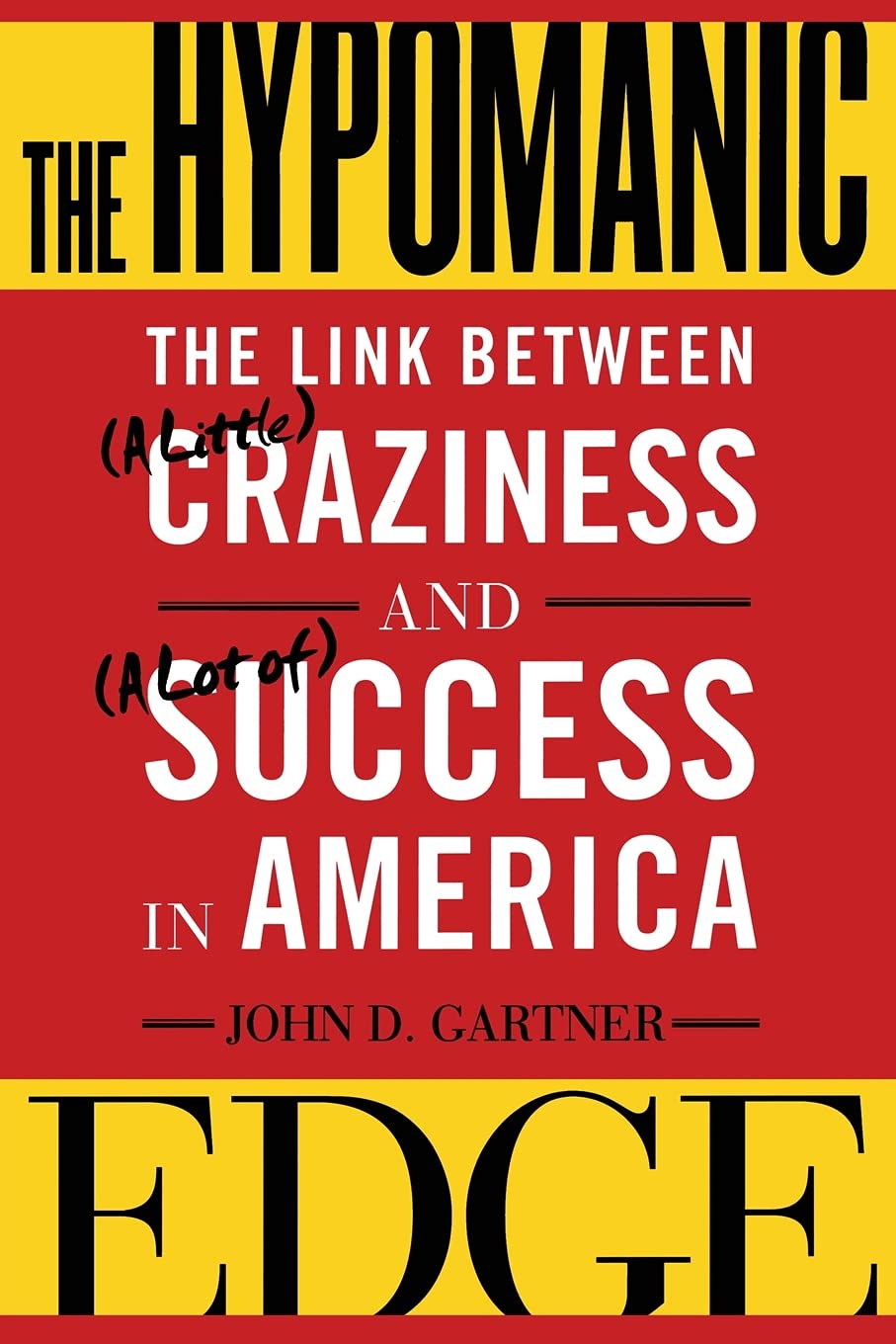

Simon & Schuster The Hypomanic Edge: The Link Between (A Little) Craziness and (A Lot of) Success in America
G**O
Incredible
Incredible
A**R
Five Stars
Love this book, a nice ballad in the human's mind.
J**G
Groundbreaking
This book is groundbreaking. Have you heard of any other psychiatrist or psychologist write a history book?I'd like Ted Turner to be added to the next book, if there is to be a sequel. Although I am reading Turner's autobiography now, 'Call me Ted', and he disappointedly says half way through the book that he took lithium for two years but his next psychiatrist dropped the lithium and he does not believe he has bipolar disorder, if you read his book and you have bipolar disorder, you *know* Ted has bipolar disorder. It takes one to know one. Failing having bipolar disorder yourself, in this case of Dr Gartner, it takes being an experienced psychiatrist to know one.I hope Ted Turner has read Gartner's book. Perhaps then he'll realize he has a fortunate case. Certainly, bipolar disorder is not a one size fits all experience.And that is what the critics -- I have only read one critic in these reviews by the way -- don't understand. That mental illness has a variety of manifestations on how it is experience, and how bad a case, or fortunate in these cases I suppose, it is.The ability to be intuitive beyond the norm is really the most valuable side effect of having bipolar disorder, in my opinion. Creativity? Sure. But the intuition and the drive to follow up on that intuition is the how someone like Ted Turner (and the dozen or so people Gartner diagnoses in his book, can be a visionary 30 years out, without resorting to marketing research studies (which probably are not visionary 30 years out.)Two enthusiastic thumbs up!
O**S
Geschichte aus psychologischer Sicht
Der Autor John Gartner ist Psychiatrie-Professor an der Johns Hopkins University. In diesem Buch untersucht er die Frage, inwieweit der wirtschaftliche Erfolg der USA auf psychologische Faktoren (Hypomanie) zurückzuführen ist.Zunächst erklärt der Autor, dass die USA als Einwanderer-Land überdurchschnittlich von Menschen besiedelt wurden, die besondere Initiative und Wagemut gezeigt hätten. Dadurch sei der Anteil von Menschen mit extremen Stimmungen überdurchschnittlich hoch, was den genetischen Pool wesentlich beeinflusst hätte. Diese Annahme ist fragwürdig, denn schließlich wurde praktisch die ganze Erde von Menschen besiedelt, die irgendwann die Heimat ihrer Vorfahren verlassen hatten. Dafür, dass es in dieser Hinsicht genetische Besonderheiten der USA-Bewohner gibt, gibt es keinen Beweis. Außerdem ist unklar, ob es wirklich genetische Faktoren sind, die manche Menschen übermütiger und euphorischer als andere machen.Von Zweifeln unbeirrt setzt der Autor seine Vermutung einfach als eine Tatsache und beginnt, historische Persönlichkeiten reihenweise psychiatrisch postmortem zu diagnostizieren. Angesichts der unsicheren Faktenlage ist es äußerst fragwürdig, Personen wie Christoph Kolumbus heute einem Krankheitsbild zuzuordnen. Der Autor tut das hemmungslos.In sechs Kapiteln widmet sich das Buch dann noch in chronologischer Folge William Penn, Alexander Hamilton, Andrew Carnegie, Metro-Goldwyn-Mayer und Craig Venter. Je näher der Autor dabei der Gegenwart kommt, desto spannender und aufschlussreicher wird das Buch. Der Abschnitt über Craig Venter, mit dem der Autor sich persönlich austauschen konnte, um seine Vermutungen zu überprüfen, ist wirklich lehrreich. Der Rest ist eher überflüssig.
S**T
A spot-free window into the American psyche.
You will enjoy reading this engrossing thread into the nature of the American mind.I was caught off guard by the effectiveness of the writing and editing that makes reading it such a delight. Each profile is more interesting than the next and I found myself falling in love with the spirit of each character.It's an informative, dazzling and fun yarn by an enthusiatic author who playfully illuminates profound insights into what makes an American, an American.
Trustpilot
1 day ago
1 month ago